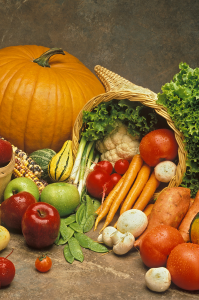That fall feeling is already here. You can feel the crispness in the morning air and native asters are already visible along the roadsides. This is the time for gardeners to make that graceful transition from summer to fall. You can rely on the following simple tips to help wind your garden down as the weather cools.
The tomatoes, basil, and peppers might be hanging loosely and looking a little rough but you can expect them to perk up as temperatures drop in the coming few weeks. So, as long as they seem to be ripening, let them be.
Tips for Herbs & Vegetables in New Jersey
For leathery basil, it would help to cut them back to two thirds as this encourages growth and will help with development of new leaves. If you have pepper in your garden, this is time to check to see if they’ve ripened. If there are any that look ready, don’t fear harvesting now. Sweet peppers harvested in fall are particularly of very high quality. Tomatoes are a little difficult to tend to especially as temperatures drop. You should expect the quality of the fruits still on the vines to diminish as the cold season sets in. However this doesn’t mean that you should do away with them, instead, let them stay, harvest early and allow them to finish ripening in a sunny spot indoors.
NJ Flower Gardening Tips
By now, most of the biennials, perennials, and bulbs that flower in the spring have died back to the ground level. Yellow foliage doesn’t benefit anyone; if anything it steals resources from healthy foliage and to the plants and mars the image of your garden. Walk around your garden, collect the foliage, and throw it into the compost. Yellow poppies (Papever) and Bleeding Heart (Dicentra) are two examples of plants whose growing seasons end early in the year and if left will lie dormant until the following summer. You may consider growing Gayfeather (Liatris) and Baby’s Breath (Gypsophila) among your spring flowing plants as they tend to hide declining plant cover by growing around and over them.
As you make the rounds in your garden, take some time to do a bit of weeding. Be ruthless with what must stay and what must go, and move plants to optimal locations if their current location isn’t ideal. Relocating plants in the garden also helps create room for flowering plants to expand and flourish, and it exposes soil for planting seeds, spring bulbs, or mulching.

